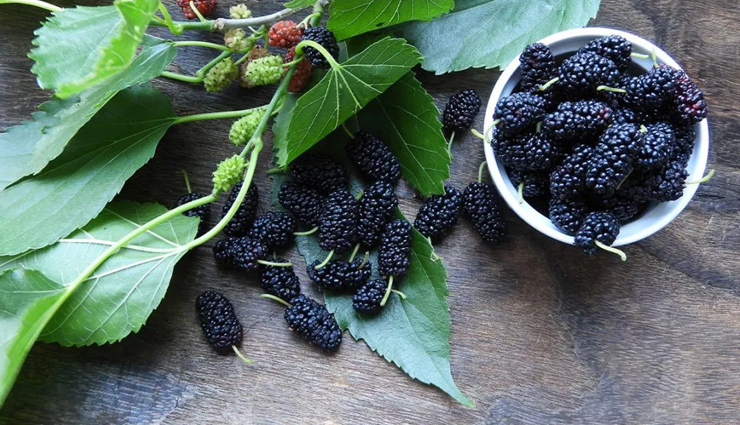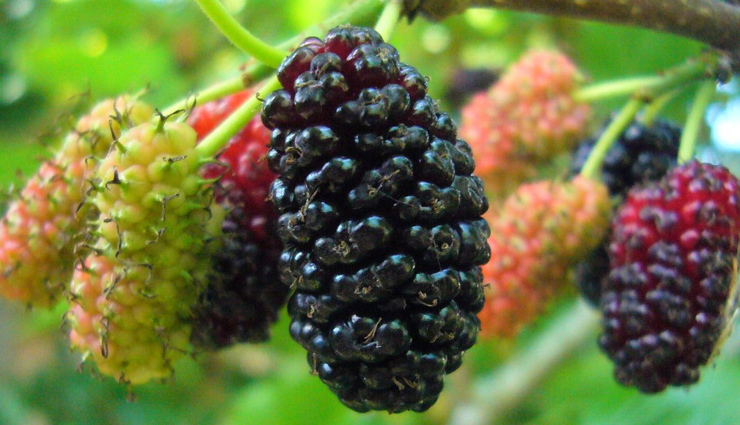- Home›
- Healthy Living›
- 5 Health Benefits Of Eating Mulberry Fruit
5 Health Benefits Of Eating Mulberry Fruit
By: Priyanka Maheshwari Sat, 02 May 2020 3:16:50

Mulberries are the sweet, hanging fruits from a genus of deciduous trees that grow in a variety of temperate areas around the world. Thought to possibly have originated in China, they have spread throughout the world and are highly praised for their unique flavor and impressive composition of nutrients. In fact, most varieties found in different parts of the world are considered to be “native” from those areas, as they are widespread. The scientific name of mulberry varies depending on which species you are looking at, the most common types are Morus australis and Morus nigra, but there are other delicious varieties as well. In terms of appearance, the berries grow very fast when they are young but gradually slow as their color changes from white or green to pink or red, and eventually settling on dark purple or even black.
The sweet or tart flavor makes these berries ideal for sherbets, jams, jellies, fruit tarts, pies, wines, teas, and cordials. In certain areas of the world, the flavors of the mulberry varieties differ, but the American mulberry and the black mulberry are considered to have the most powerful flavor and are widely sought after. Interestingly, the mulberry tree has another important resource, besides providing people with delicious berries and that is its leaves. The mulberry leaves are also the only known food source for silkworms.
* Aid in Digestion
Like the majority of fruits and vegetables, mulberries contain dietary fiber, which makes approximately 10% of your daily requirements in a single serving. Dietary fiber can help to improve digestion by bulking up the stool, thereby speeding up the movement of food through the digestive tract, while also reducing occurrences of constipation, bloating, and cramping. Furthermore, fiber helps to regulate cholesterol levels and can improve heart health when regularly added to the diet.

* Increase Circulation
The high levels of iron content in mulberries can significantly boost the production of red blood cells. This means that the body will increase its distribution of oxygen to important tissues and organs, thereby helping to boost metabolism and optimize the functionality of those systems.
* Regulate Blood Pressure
Resveratrol is a very important flavonoid that directly affects the functioning of certain mechanisms in blood vessels, primarily making them less prone to damage by angiotensin, which can cause blood vessel constriction. In fact, resveratrol increases the production of nitric oxide, which is a vasodilator. This means that it relaxes blood vessels and reduces the chances of blood clot formation and subsequent heart issues like strokes or heart attacks. Resveratrol is found in many dark-skinned berries like mulberries, including most grapes, which is why this beneficial antioxidant is also found in wines.

* Anti-cancer Potential
Between the high content of anthocyanins, vitamin C, vitamin A, and various other polyphenolic and phytonutrient compounds, mulberries are also packed with antioxidants. Antioxidants are the main line of defense against free radicals, which form a dangerous by-product of cellular metabolism and can damage healthy cells, causing them to mutate into cancerous ones. A study conducted by Huang HP et al. suggested that mulberry anthocyanin extract can slow down melanoma metastasis.
* Improve Vision
One of the carotenoids found in mulberries is zeaxanthin, which has been connected directly to a reduction in oxidative stress on certain ocular cells, including the retinal macula lutea. Furthermore, zeaxanthin functions as an antioxidant and prevents certain damage to the retina, including the free radicals that can cause macular degeneration and cataracts.





